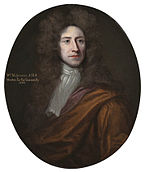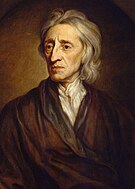モリヌークス問題
表示
| 目が見えていなかった人間が視力を獲得した場合、目が見えていなかった時に触覚その他で理解していた概念を視覚で認識出来るか。 |
モリヌークス問題︵モリヌークスもんだい、Molyneux's Problem︶は、哲学上の未解決問題の一つ。弁護士で光学研究の専門家でもあるウィリアム・モリノー(モリヌークス[1])(1656-1698)がジョン・ロックに宛てた書簡の中で示した疑問で、触覚・視覚による認識の違いと経験についての問いである。
 生まれつきの盲人が成長するなかで、同じ金属でほぼ同じ大きさの立方体と球体を触覚で区別することを学び、触ったときどちらが立方体または球体であるかを言えるようになったとする。そして今、この盲人が見えるようになったとする。
問い‥盲人が見えるようになった今、テーブルに置かれた立方体と球を、それに触る前に視覚で区別し、どちらが球体でどちらが立方体なのかを言えるか?
(1693年3月2日,ロックに宛てたモリノー(モリヌークス)の手紙)[5][6]。
生まれつきの盲人が成長するなかで、同じ金属でほぼ同じ大きさの立方体と球体を触覚で区別することを学び、触ったときどちらが立方体または球体であるかを言えるようになったとする。そして今、この盲人が見えるようになったとする。
問い‥盲人が見えるようになった今、テーブルに置かれた立方体と球を、それに触る前に視覚で区別し、どちらが球体でどちらが立方体なのかを言えるか?
(1693年3月2日,ロックに宛てたモリノー(モリヌークス)の手紙)[5][6]。
 開眼した盲人は︵視覚で︶距離の判断ができるか? (1688年にモリノー(モリヌークス)がロックに宛てた最初の手紙より︶[7]。
開眼した盲人は︵視覚で︶距離の判断ができるか? (1688年にモリノー(モリヌークス)がロックに宛てた最初の手紙より︶[7]。

Descartes body physics 1
この問題は、﹁立方体﹂﹁球﹂といった幾何学的概念は経験によって獲得されるのか、それとも幾何学概念は一般的概念と同様に"先天的"に備わっているのか、という伝統的な哲学問題と関わっている[7]。特にデカルトが﹃屈折光学﹄︵1637年︶で、盲人が対象の大きさを認識するときに杖を交差させて対象に触れその角度によって判断することを挙げ、眼球が光線の交差を使って対象の大きさを認識するとしたことが、モリヌークス問題の前提にある。デカルトが触覚と視覚に類比関係をたてたこと、および、二つの知覚を幾何学的観念のもとに還元したことに、ロックは反対したのである。幾何学的概念も知覚という経験によって形成されるのであって先天的に備わっているのではない、というのがロックにとってモリヌークス問題(モリヌークスの疑問)の主眼であった。[10]
この問題は18世紀のイギリス・フランスでホットな問題として盛んに論じられ、そのあと異種感覚間の問題として展開され、広範囲に影響を及ぼしながら今日に至る[11]。
知覚の様式[12](ここでは視覚と触覚)と事実認識の関係については、現在でも脳科学やメディア工学の領域でクロスモーダルの研究として進行形である[13]。また、モリヌークス問題は当時の哲学者たちがこれにどう応えたかによってそれぞれの哲学的個性が浮き彫りになった点でも興味深い問題だった。
内容[編集]
概要は﹁球体と立方体を触覚的に判別できる先天盲者が開眼手術を受けたとき、開眼した盲人は視覚だけで球体と立方体を判別できるか?﹂というものである。妻の失明を経験した[2]モリヌークスが尊敬していたジョン・ロックにこの疑問を手紙で送ったのは﹃人間知性論﹄の刊行以前であった。ロックは﹃人間知性論﹄の初版ではこの疑問を取り上げなかったが、モリヌークスから二度目の手紙(1693年3月2日付)[3]を受け取って、第二版(1694年)でこの問いを紹介した[4]解説[編集]
類似した問題は、12世紀初期にイブン・トファイル(アブバーケル)によっても提示された。これは、彼の著書﹃ヤクザーンの子ハイイ﹄(小説形式の哲学書)に見える。しかしながら、トファイルは主として形ではなく色を扱ったという違いがある[8][9]。
種々の回答[編集]

コンディヤック

ディドロ

ビュフォン
●モリヌークス自身は、開眼盲人は、球・立方体が視覚に対しどう作用するかの経験を得ていないので識別できない、と答えている。[5][7]
●問われたジョン・ロックも、視覚と触覚は全く異なる感覚であるため、先天盲者は開眼して"最初に見た時"は、視覚的に球体と立方体を弁別することはできないだろうが、直接それを触ってそれぞれに名前をつければ識別できるようになる、と考えた[5][14]。ロックによれば、球体を前にしたとき、通常われわれが受ける感覚は﹁陰影のある平たい円形﹂にすぎないのだが、球体を見て、触る﹁経験﹂を重ねることでその﹁陰のある平たい円形﹂が球体であると無意識に判断する習慣を身につけるのである。[15]
●ライプニッツは、ロックの﹁最初に見た時﹂という条件をなくした上で、幾何学は理性の中に先天的にあるという原理に従って﹁識別できる﹂と﹃人間知性新論﹄に記した(1703年に書き終えたが未刊行)。(﹁できる﹂という考えの系譜として一ノ瀬正樹はポーターフィールド、ハミルトン[16]、アボット、エヴァンズといった名前を挙げている)。[7]
●ジョージ・バークリーは、視覚観念と触覚観念は異質な種であり、その結びつきは習慣的に運動を介したものに過ぎないので、両者は結びつかず触覚に基づいた視覚的弁別は不可能である、と﹃視覚新論﹄(1709年)で完全否定した。さらにバークリーは、距離知覚の問題においても同様に、運動を介さなければ異種感覚は結びつかないとした[7]。ロックの経験論をさらに精錬するのが自分の役割だと自認していたバークリーは、基本的に異なる感覚の間で共通にわかち合うことのできる観念はない、とした。すなわち﹁空間、外部、そしてある距離に置かれた事物、これらの観念は、厳密に言うと、視覚の対象ではな﹂く、﹁光と色以外には、視覚の直接の対象は存在しない﹂のだから﹁この両感覚に共通の観念はない﹂と断じている[17]
●コンディヤックは、フランスのロックと呼ばれるほどのロック支持者だったが、この問題に関してはロックを批判し、”われわれが球体を前にしたとき円形などを見るのではなく、まさに球体のように見えるものを見るのであり、たとえばレリーフが平面的に見えているときそれを実際に触って凸凹を触覚で感じてもレリーフが平面的に見えることは変わらず、そもそも﹁無意識的な判断﹂などというものはないのだ、と﹃人間認識起源論﹄(1746)で述べた。しかし、8年後に書かれた﹃感覚論﹄では﹁人間の感覚器官が生まれつき完全に機能していると考えたのは偏見だった﹂と自己修正し、﹁彫刻(心はあるが何の感覚ももたない仮想的人間)が、初めて球体を見たときに受け取る印象は陰影のある平たい円形である。目で見つつ触ることによって、立体感を判断するようになる﹂とロックと同じ立場にたった。[15]
●ディドロは﹃盲人に関する手紙︵盲人書簡︶﹄(1749年)で、モリヌーク問題には﹁生まれつきの盲人は、白内障の手術が行われるとすぐに見ることができるかどうか﹂という問いと、もし見えて﹁図形を十分判別﹂できたとしてその対象に﹁触っているときにつけていた名前﹂を同定できるのか(つまり触覚の経験と視覚の経験は悟性の中で結びついているのか)という二つの問いが含まれていると指摘した。ディドロは、ヴォルテールが1738年の著作でフランスに紹介したイギリス外科医チェゼルデンによる先天性白内障の少年の開眼手術(1728年)の報告から、開眼した少年が術後しばらくは何も見分けられず、事物があたかも触覚で皮膚に押し当てられるが如く眼球という﹁器官に押し当てられているように﹂感じた事を引き﹁幼児や生まれつきの盲人は、眼底には事物がひとしく写されているにもかかわらず、それらを認めることができない﹂と記した。 [18]
●博物学者ビュフォンは友人ディドロの﹃盲人書簡﹄を同年に刊行した﹃人間の自然誌﹄の註に賞賛の言葉とともに掲載した。﹃盲人書簡﹄が無神論的であるとしてディドロはヴァンセンヌ刑務所に投獄されたが、ビュフォンは註を削除しなかった。なおビュフォンはコンディヤックよりロックを支持したため、コンディヤックに恨まれたという。[19]
●ジュール・ラニョーは﹃モリヌークスの問題﹄をアレンジして﹁先天性盲者が片目づつ期間をおいて開眼すると、ものがどう見えるか﹂という﹁盲人の問い﹂にしてリセの生徒たちに作文を課した。[20]
●ラニョーの生徒だったアランはラニョーがアレンジした盲人の問いで哲学に目覚めた[20]。アランの生徒だったシモーヌ・ヴェイユも教師時代、この問いを生徒に出している[21]。
医師・学者たち[編集]
- イギリスの医師ウィリアム・チェゼルデンは医学史にその名を残す偉大な外科医である[22]。同国のバークリーはR.Grantという眼科医の開眼手術に1709年『視覚新論』ですこし触れたが、『視覚論弁明』(1733年)では、チェゼルデンが「哲学会報」に載せた開眼手術の経過(1728年)を詳しく引用し自論が実証されたと記した[23]。

白内障手術墜下法(図1583年)
開眼者は13才の先天性白内障の少年だった。当時の開眼手術は白内障だけで、光が網膜に届くのを邪魔している白濁した水晶体を針で眼球の中(ガラス体)に堕として邪魔ものをなくし眼底まで光を通す、という紀元前から行われている墜下法(couching)だった。手術の歴史は長く、それなりに確立した手技だったが成功する保証はなかった[24]。
少年の手術は成功したが、開眼直後の報告では彼は対象の区別ができず、当然距離も判らず﹁すべての対象が﹂﹁眼にくっついてる﹂ように感じた。少年は術前から昼夜はわかり、光が強ければ白と黒と緋色(Scarlet■)を判別できる程度の視能は持っていた。が、開眼直後それらの色は異なって見え、少年は色と色名を結びつけられなかった。こういった報告は地元のバークリーのみならず、ヴォルテールによってフランスにも伝えられ、コンディヤックもディドロもモリヌークス問題を論じた著作の中で取り上げた。[25]


脚注[編集]
- ^ 1.他に、モリニュクス,モリヌーなど;外国人名読み方字典(Weblio辞書)"Molyneux"
2.実際にMolyneuxの発音を聴くと,モリヌークス(アイルランド),モリニュー/モリンクス/モリヌークス(イギリス),モリヌ/モリヌー(フランス),モリニュークス(スペイン北西部,日本),モリヌークス/モリニュークス(イタリア),モリノー/モリンクス(アメリカ)など。発音サイト(フリー)(2015年8月25日試聴). - ^ en:William Molyneux#Life
- ^ #外部リンク(Molyneux's Problem & Stanford Encyclopedia)に手紙原文
- ^ 「Molyneux's Problem」 & Stanford Encyclopedia of Philosophy.
- ^ a b c John Locke, An Essay Concerning Human Understanding, book 2, chapter 9:[1]
"I shall here insert a problem of that very ingenious and studious promoter of real knowledge, the learned and worthy Mr. Molyneux, which he was pleased to send me in a letter some months since; and it is this:- "Suppose a man born blind, and now adult, and taught by his touch to distinguish between a cube and a sphere of the same metal, and nighly of the same bigness, so as to tell, when he felt one and the other, which is the cube, which the sphere. Suppose then the cube and sphere placed on a table, and the blind man be made to see: quaere, whether by his sight, before he touched them, he could now distinguish and tell which is the globe, which the cube?" To which the acute and judicious proposer answers, "Not. For, though he has obtained the experience of how a globe, how a cube affects his touch, yet he has not yet obtained the experience, that what affects his touch so or so, must affect his sight so or so; or that a protuberant angle in the cube, that pressed his hand unequally, shall appear to his eye as it does in the cube."- I agree with this thinking gentleman, whom I am proud to call my friend, in his answer to this problem; and am of opinion that the blind man, at first sight, would not be able with certainty to say which was the globe, which the cube, whilst he only saw them; though he could unerringly name them by his touch, and certainly distinguish them by the difference of their figures felt. This I have set down, and leave with my reader, as an occasion for him to consider how much he may be beholden to experience, improvement, and acquired notions, where he thinks he had not the least use of, or help from them. And the rather, because this observing gentleman further adds, that "having, upon the occasion of my book, proposed this to divers very ingenious men, he hardly ever met with one that at first gave the answer to it which he thinks true, till by hearing his reasons they were convinced." ・^ ジョン・ロック 著、大槻春彦 訳﹃人間知性論1﹄岩波文庫、1972年、205頁。と鳥居修晃﹃先天盲開眼者の視覚世界﹄東京大学出版会、2000年、6頁。の訳文を合成、一部改変 ・^ abcde(﹃哲学の歴史6﹄ 2007, pp. 168–170)コラム<モリヌークス問題> 執筆者;一ノ瀬正樹 ・^ Muhammad ibn Abd al-Malik Ibn Tufayl and Leon Gauthier (1981), Risalat Hayy ibn Yaqzan, p. 5, Editions de la Mediterranee:[2] "If you want a comparison that will make you clearly grasp the difference between the perception, such as it is understood by that sect [the Sufis] and the perception as others understand it, imagine a person born blind, endowed however with a happy natural temperament, with a lively and firm intelligence, a sure memory, a straight sprite, who grew up from the time he was an infant in a city where he never stopped learning, by means of the senses he did dispose of, to know the inhabitants individually, the numerous species of beings, living as well as non-living, there, the streets and sidestreets, the houses, the steps, in such a manner as to be able to cross the city without a guide, and to recognize immediately those he met; the colors alone would not be known to him except by the names they bore, and by certain definitions that designated them. Suppose that he had arrived at this point and suddenly, his eyes were opened, he recovered his view, and he crosses the entire city, making a tour of it. He would find no object different from the idea he had made of it; he would encounter nothing he didn’t recognize, he would find the colors conformable to the descriptions of them that had been given to him; and in this there would only be two new important things for him, one the consequence of the other: a clarity, a greater brightness, and a great voluptuousness."・^ Diana Lobel (2006), A Sufi-Jewish Dialogue: Philosophy and Mysticism in Ba??ya Ibn Paq?da's Duties of the Heart, p. 24, University of Pennsylvania Press, ISBN 0812239539. ・^ (亀井一 & ジャン・パウルは死にどのような形をあたえたのか(第Ⅰ報)<Ⅱ.小説モチーフとしてのモリヌークス問題> 2009, pp. 5–6) ・^ (大橋康宏 2009, p. 34) ・^ 近年は﹁感覚モダリティ(様相)﹂とも呼ばれる感覚モダリティ ・^ ﹁クロスモーダル﹂検索により様々な研究・論文が見つかる。︵例えば、高橋真﹁ラットにおけるクロスモーダル知覚の検討﹂﹃真宗総合研究所研究紀要﹄第30号、大谷大学真宗総合研究所、2011年、125-140頁、ISSN 1343-2753、NAID 120005721333、2022年2月2日閲覧。、横山牧, 蜂須拓, 佐藤未知, 福嶋政期, 梶本裕之﹁視触覚クロスモーダル現象を用いたタッチパネルへの触覚フィードバックの付加 (ヒューマン情報処理)﹂﹃電子情報通信学会技術研究報告 : 信学技報﹄第112巻第483号、電子情報通信学会、2013年3月、93-98頁、ISSN 0913-5685、NAID 110009713391、2022年2月2日閲覧。など︶ ・^ ﹃人間知性論﹄第二版でロックはモリヌークス問題を紹介したが、モリニュクス(モリヌークス)が1866年の手紙で提示した問2には触れなかった。一ノ瀬正樹は﹁モリヌークス問題のミステリーといえよう﹂と記している。(前掲書.p.169) ・^ ab﹃哲学の歴史6﹄7章﹁コンディヤック﹂︵執筆:山口裕之︶pp.365-366 ・^ ウィリアム・ハミルトン (第9代準男爵)-スコットランド18-19世紀の哲学者 ・^ (視覚の世界 & 鳥居修晃 1979, p. 3) ・^ 1.(ディドロ著作集 第一巻, 1976 & 平岡昇訳, pp. 87–92)引用箇所は(視覚の世界 & 鳥居修晃 1979, pp. 4–6)<ディドロの二つの問題>より孫引き. 2.如月. “ディドロとモリヌークス問題~盲人に関する手紙﹂から~”. 世善知特網旧殿. 2015年8月23日閲覧。 ・^ ジャック ロジェ (1992-4). 大博物学者ビュフォン―18世紀フランスの変貌する自然観と科学・文化誌. 工作舎. pp. 192-194. ISBN 4875021968 ・^ abアラン ﹃アラン著作集︿第1巻﹀思索と行動のために Elements de philosophie(哲学概論)﹄ 中村雄二郎訳、白水社、1960年。 ・^ シモーヌ・ペトルマン﹃シモーヌ・ヴェイユ詳伝 Ⅱ﹄田辺保訳、勁草書房新装版、2002年。p.136 ・^ 例えばチャールズ・シンガー 著、酒井シズ,深瀬 泰旦 訳﹃医学の歴史1‥古代から産業革命まで﹄朝倉書店、1985年11月25日、155頁。ISBN 4254105312。 ・^ (先天盲開眼者の視覚世界 & 鳥居修晃,望月登志子 2000, pp. 8–9) 以下﹃先天盲開眼者﹄(2000)と略す ・^ 三島済一﹁特別講演:白内障手術の歴史(連載第一回)﹂﹃臨床眼科﹄第48巻第8号、1994年8月、1490-1493頁、ISSN 1882-1308。三島済一﹁特別講演:白内障手術の歴史(連載第二回)﹂﹃臨床眼科﹄第48巻第9号、1654-1657頁。 ・^ ﹃先天盲開眼者﹄(2000)pp.6-11 ・^ ab﹃視覚の世界﹄鳥居修晃(1979)。<3.開眼直後の視覚体験>p.14-28 ・^ (白内障手術の歴史(連載第二回), pp. 1655–1656) ・^ ﹃ディドロ著作集1﹄<盲人に関する手紙>、平岡昇訳、法政大学出版局、1976年。p.100((視覚の世界 & 鳥居修晃 1979, pp. 62–63)<動機づけの問題>より孫引き) ・^ ﹃先天盲開眼者﹄(2000)pp.18-20,143-145,296-297,及び巻末人名索引 ・^ 1.黒田自身が観察したものを含め1801-1928年まで14症例(﹃視覚の世界﹄p.15-16)。﹁手術ニヨリテ開眼セル四十二歳先天性白内障夫人患者ニ就イテノ調査報告﹂(1930) Acta Psychologica keijo, vol.1,No.1, pp.17-42(同書.註(4)p.28) 2.コトバンク<黒田亮> ・^ 11世紀~1931年までの66例(﹃先天盲開眼者﹄(2000),pp.12-18}.<WorldCat "Marius von Senden"検索画面、参照としてen:Recovery from blindness#Early cases ・^ #参考文献・サイト,cinii 鳥居修晃、cinii 望月登志子 ・^ プロジェクト・プラカシュHP ・^ en:Molyneux's problem#Responses










